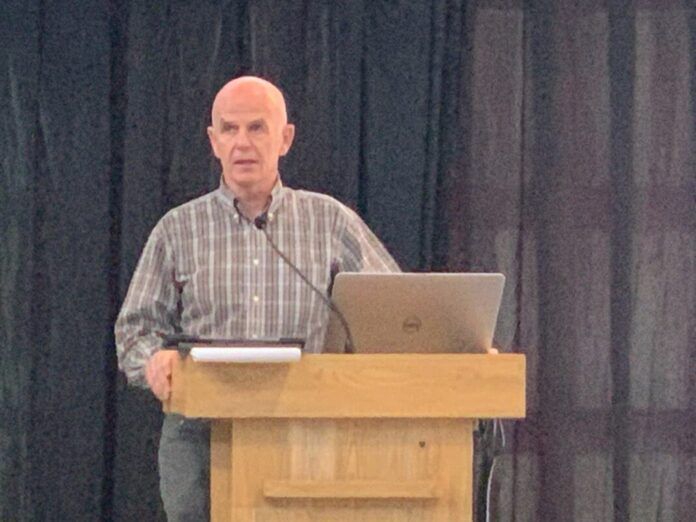Quesnel hosted a forestry think tank at the North Cariboo Community Campus this week.
Three key questions came out of the two day session on Tuesday and Wednesday.
Former Mayor Bob Simpson is now a forestry consultant.
“How do we manage the forest differently, how do we manufacture different products from forest fibre, and then how do we retrain the workforce to both of those things ?”
Simpson says a crucial piece to understand is how do you produce forest products without workers ?
“We’re talking automation at a level that we have not seen before. If anybody walks into our MDF Plant here, that’s the kind of future we’re looking at in our sawmills, if we get into mass timber modular manufacturing etc, where people are sitting in a control booth and there’s nobody on the shop floor. That’s where we’re going to have to go and we’re going to be forced to go there because there’s no labour force to do this work anymore.”
Simpson says the type of workers will also then change.
“If we do change the way that we’re manufacturing what does that workforce look like and if it’s automated, we had a presentation on artificial intelligence, then you are really needing people who are good gamers, not people are used to really hard physical work and turning boards to grade them but somebody who is playing with a joy stick and making things happen.”
He says that fundamental shift has to be accelerated, which is what they’re trying to do.
“We need to change that dynamic and we need to be able to move a lot faster. So this afternoon we’re actually going to start landing on what exactly do we need to focus on in Quesnel because our think tank process is located in Quesnel and in the North Cariboo. We believe it is a scale that we can do some of this thinking at instead of trying to do it at a provincial scale because you just throw your hands up, you can’t do the thinking at that level”
Simpson says Quesnel is already a recognized research hub, already has international partnerships that they’re able to leverage for a lot of this innovation, Quesnel has good research partners, UBC, UNBC, Laval University etc, and good partnerships with West Fraser and the Council of Forest Industries.
He says there was also a lot of discussion during the think tank about what the industry should be manufacturing.
“British Columbia has been know forever as a primary manufacturing sector. We’ve produced dimension lumber, panels, pulp but the world is moving away from that because there’s no construction workforce. So because that construction workforce has disappeared, we now have to ask the question of how do we move to mass timber, how do we move to modularizing construction and what does that look like in terms of the workforce and in terms of the kinds of investments we have to attract here in British Columbia ?”
Simpson says he thinks it’s one of their biggest challenges with a sector that’s made really good money over the years off of a two-by-four.
“Now that two-by-four has no worker to put it together on site to build anything with it, so what does that mean in manufacturing ?”
Participants in the think tank broke down into cafe style groups and started coming up with potential answers to the three key questions mentioned at the beginning of this story.
A final report will be coming out soon.
Simpson says the intention is to continue the think tank process.
“We’re talking, and some advice has been given to the city, to do more work on each of the three streams in between the big get togethers. So work the landscape piece, work the workforce piece, and work the manufacturing piece with the different groups that are here, and then reconvene everybody again in 2024.”
–Files by George Henderson, My Cariboo Now



